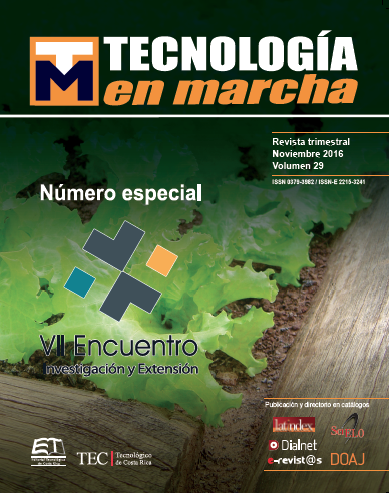Technical, environmental and economical evaluation of three types of treatment for lettuce growing in vegetables gardens, in Santa María de Guácimo, Limón, Costa Rica
Main Article Content
Abstract
Tecnológico de Costa Rica has developed collaborative actions with the Guácimo local Government (Limón province, Costa Rica) through research and a doctoral thesis. As a follow-up, another research and extension project was proposed, called Establishment of vegetables home gardens using solid waste in a pilot group in the Santa María de Guácimo community. This project carried out activities like the analysis of prior sudies regarding solid waste generation and composition in the community, as well as trials of different types of treatment for biodegradable solid waste through composting. The graduation project named Technical, environmental and economical evaluation for three lettuce treatments from home food-gardens in Santa María de Guácimo, Limón, Costa Rica” joined in support to the objectives of the first one. Since Guácimo’s Municipality faces monetary challenges to manage its wastes, the proposal of treating biodegradable solid wastes through domestic composting and using that compost in home gardening seemed to be an adequate option. Therefore, the evaluation in purpose of the study mention above became relevant. The Takakura composting method, the MM composting method and the commercial compost and a trial witness were applied in lettuce gardens. After analyzing the results in terms of mass, diameter, cost and environmental opportunities, they showed that although the Takakura composting method had a higher cost, it could produce wider environmental and economic benefits.
Article Details
Los autores conservan los derechos de autor y ceden a la revista el derecho de la primera publicación y pueda editarlo, reproducirlo, distribuirlo, exhibirlo y comunicarlo en el país y en el extranjero mediante medios impresos y electrónicos. Asimismo, asumen el compromiso sobre cualquier litigio o reclamación relacionada con derechos de propiedad intelectual, exonerando de responsabilidad a la Editorial Tecnológica de Costa Rica. Además, se establece que los autores pueden realizar otros acuerdos contractuales independientes y adicionales para la distribución no exclusiva de la versión del artículo publicado en esta revista (p. ej., incluirlo en un repositorio institucional o publicarlo en un libro) siempre que indiquen claramente que el trabajo se publicó por primera vez en esta revista.

